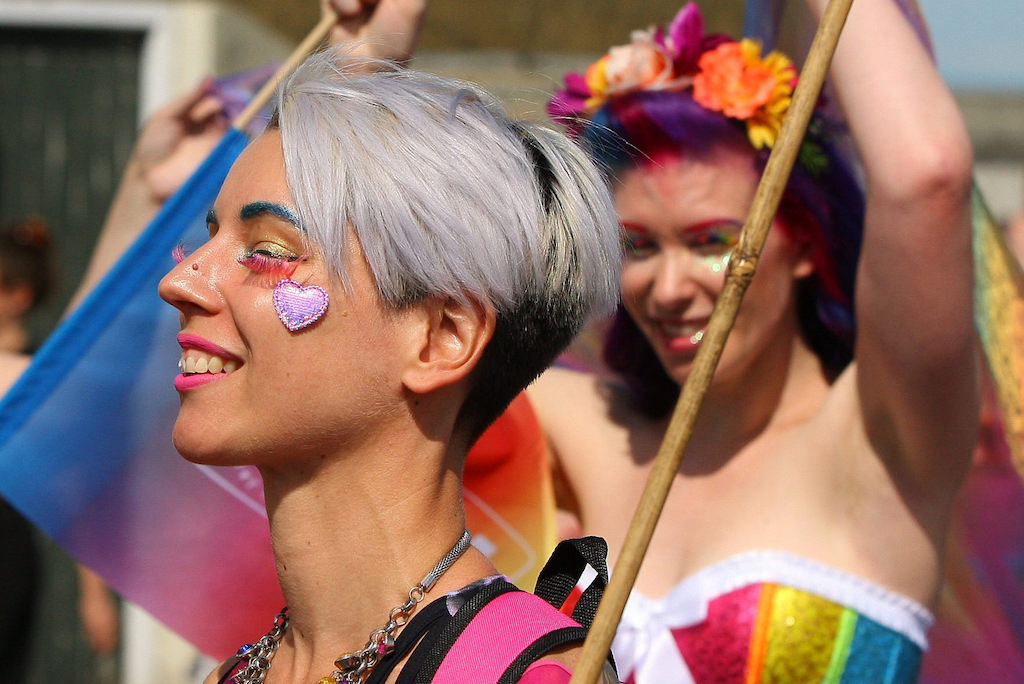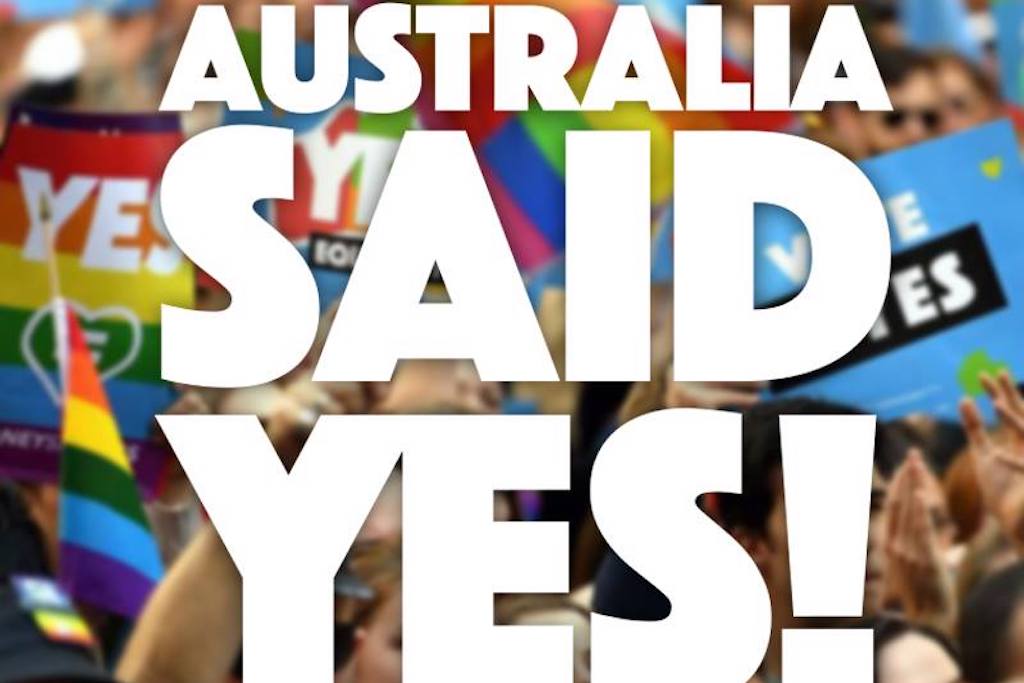Why I’m Celebrating LGBTIQ Progress And Letting Go Of The Pain
This has been a hard road, but it's what's ahead that counts.

As David Kalisch, the ABS chief statistician, came on to the screen to announce the results of the postal survey on marriage equality I started to shake. In one go all the emotional energy that had been building for months was suddenly being released.
I watched the results announcement on Wednesday at one of the many public events around the country. In Canberra a group of friends organised a picnic in Haig Park — a vast, and largely unused landscape, central to the city. My friends organised it so people could be together, planning what they thought would be a relatively intimate affair. But the event quickly gathered steam, with hundreds of people taking the morning off to watch the results.
I got to the picnic early and spent the morning helping set up and mingling with friends. I had spent most of my Tuesday feeling nervous, a pit in my stomach growing across the day. But on Wednesday I felt calm, confident it would be a good day.
A good day it was. When Kalisch announced that over 7 million people had voted yes a huge cheer ran through the crowd. Champagne corks flew through the air, the nervous energy replaced by excitement and joy.
I started to cry. I cried not because I want to get married, or even because I am that excited about marriage legislation passing. I cried because this vote symbolised something very important to me: that our community may be finally starting to embrace queer people.
This Is A Victory!
There have been a lot of negative feelings about this process. Large marriage equality organisations and most prominent marriage advocates opposed the use of any form of public vote to help decide this issue. There have been many genuine concerns about the impact the vote had on vulnerable queer people, with some prominent queer activists arguing that the vitriol seen in the past few months has been at a similar level to that of what was seen decades ago.
For many, this is a process — and a time in our queer history — that we would like to forget. We’ve already heard many say that this is something that should never be repeated. This has been treated as a stain on our democratic system; a time when our government threw queer people under the bus.
I propose we should think about this time differently. Instead of seeing the postal survey as a time to forget, we should see it for what it was: a huge victory.
Think about the significance of what just happened. Over the past few months, over 7 and a half million people made the active choice to vote in favour of equality for LGBTIQ+ Australians. Millions of people around the country ignored the fear mongering and bigotry, and instead took an active step to stamp out an important piece of discrimination.
I cannot think of any other social issue that has seen such a significant shift in such a short time.
Most importantly this was not just limited to the city centres, which are often seen as the only centres of progressivism in Australia. People voted in favour across the country — from small towns to large cities, from poor areas to rich. Every state and territory voted yes, with only 17 of our federal electorates voting no. Perhaps most astonishingly, every rural electorate, bar three in Queensland, voted yes, annihilating the stereotype of a ‘bigoted’ and ‘backward’ Australian bushland.
This is a sign of huge changes that have occurred in our community. It’s easy to forget that it was only just over two decades ago that Tasmania became the last state in the country to decriminalise gay sex. This year, Tasmania voted in favour of marriage equality legislation 63.6 — 36.4 percent. Go back only ten years and support for marriage equality would have been half of what was in this vote. I cannot think of any other social issue that has seen such a significant shift in such a short time.
For those of us who are concerned about the impacts this vote have had on vulnerable queer people, this is especially important. Growing up queer can be an isolating thing, particularly for those in rural and remote communities. It can often feel like you have supporters nowhere — that there is no one out there who understands you. Now those queer kids can look around and see thousands of people in their community who have taken at least one step to rid our society of homophobia.
Through this vote we have the first ever indication of the real level of support that queer people have in our community. Of course a vote for same-sex marriage does not mean someone is not a homophobe. It does not mean that they support trans or intersex people, Safe Schools, or a growing diversity in relationship types. But it is a strong start. Through this campaign, and through this successful vote, we’ve seen millions of people publicly voice a growing embracing of LGBTIQ+ people.
How We Should Remember
On Wednesday night, after the initial emotions had calmed, I went to a street party in Braddon in Canberra with my partners. The street was packed and the mood was electric. We danced, we cheered, we drank, we celebrated. I can hardly think I’ve ever been in a place or a moment where I could feel so much joy.
Just like the morning before, the joy was not just about the imminent passage of marriage legislation. It was a feeling of validation — a feeling from queers that we were finally being embraced by the Australian community.
As I partied I could not help but think that this event, that this day of celebration, would never have happened had it not been for this vote. The passage of legislation in our parliament would not have been as affirming or exciting, as it would not have publicly had the weight of an entire nation behind it.
While of course this vote is not an end in itself, and while it showed that there is a lot of work to do in our community, having the weight of over 7 and a half million people standing in solidarity with the queer community is really important. It is the kind of boost that will be vital for all those queers who are struggling at some point of time, just as it was in Ireland a number of years ago.
It is a real possibility, in fact almost a certain potential, that looking back on this campaign many will see it as a difficult moment we should all want to forget. There was intense bigotry that came out through this process, and it was hard. But what we also saw were acts of kindness, solidarity and justice — ones that, based on the results, clearly outweighed their counterpart.
It is these acts, and this victory, that we should remember. They are acts of a changing society — one that is clearly becoming more embracing of LGBTIQ+ people, and more willing to publicly voice that.
Yes this process was hard. But, change is hard. It requires struggle. When you get to the end of the struggle, and you win, you have to celebrate, not lament how hard it was to get here. That is how we should look back on these past months: as a huge victory for queer people!
–
Feature image: Flickr CC.
–
Simon Copland is a freelance writer and climate campaigner. He blogs here and tweets at @SimonCopland.
